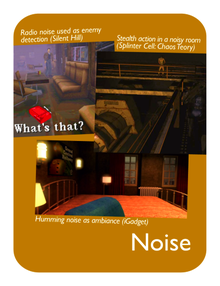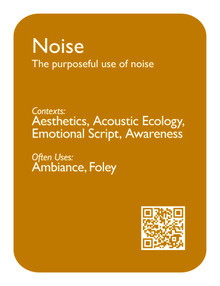Difference between revisions of "Noise"
From SoundInGames.com - Sound Design in Games
ValterAlves (Talk | contribs) m |
ValterAlves (Talk | contribs) m |
||
| Line 20: | Line 20: | ||
| ex1=<mt p="Noise" g="Gadget" altg="iGadget" w="{{ViPhoneH}}" h="{{ViPhoneW}}"></mt> | | ex1=<mt p="Noise" g="Gadget" altg="iGadget" w="{{ViPhoneH}}" h="{{ViPhoneW}}"></mt> | ||
| ex2=<mt p="Noise" g="Limbo" w="{{R16by9W}}" h="{{R16by9H}}">Limbo presents us an example of the use of [[Noise]] as part of the [[Ambiance]] {{Pending|[REF]}}. In this case, noise is constant and soft.</mt> | | ex2=<mt p="Noise" g="Limbo" w="{{R16by9W}}" h="{{R16by9H}}">Limbo presents us an example of the use of [[Noise]] as part of the [[Ambiance]] {{Pending|[REF]}}. In this case, noise is constant and soft.</mt> | ||
| − | | ex3=<mt p="Noise" g="Silent Hill" w="{{RPS2W}}" h="{{RPS2H}}">In the Silent Hill series, the PC carries a [[Radio]] | + | | ex3=<mt p="Noise" g="Silent Hill" w="{{RPS2W}}" h="{{RPS2H}}">In the Silent Hill series, the PC carries a [[Radio]] that emits a static [[Noise]] when there are enemies in the surroundings, contributing to [[Awareness]], which is a relevant element of gameplay.</mt> |
| ex4=<mt p="Noise" g="Flower" w="{{R16by9W}}" h="{{R16by9H}}">[[Noise]] as part of the starting point for the unfolding of the [[Emotional Script]] along the experience, as explored in the game's [[Menus]]. In the beginning of the game the [[Menus|Menu]] presents an [[Acoustic Ecology]] (predominantly [[Ambiance]]) allusive to a emotionally negative environment. As the game progresses, it becomes more positive and eventually it becomes highly rewarding.</mt> | | ex4=<mt p="Noise" g="Flower" w="{{R16by9W}}" h="{{R16by9H}}">[[Noise]] as part of the starting point for the unfolding of the [[Emotional Script]] along the experience, as explored in the game's [[Menus]]. In the beginning of the game the [[Menus|Menu]] presents an [[Acoustic Ecology]] (predominantly [[Ambiance]]) allusive to a emotionally negative environment. As the game progresses, it becomes more positive and eventually it becomes highly rewarding.</mt> | ||
| ex5=<mt p="Noise" g="Chaos Theory" altg="Tom Clancy's Splinter Cell: Chaos Theory" w="{{R5by4W}}" h="{{R5by4H}}">The level of [[Noise]] as part of the gameplay, namely in [[Stealth]] operations. Here, [[Noise]] is understood as the ''loudness'' of the [[Ambiance]] and of the PC's actions. If the PC makes more [[Noise]] than its surroundings he is heard by the opponents. The HUD includes an aural monitor that allows to compare both levels of [[Noise]]. | | ex5=<mt p="Noise" g="Chaos Theory" altg="Tom Clancy's Splinter Cell: Chaos Theory" w="{{R5by4W}}" h="{{R5by4H}}">The level of [[Noise]] as part of the gameplay, namely in [[Stealth]] operations. Here, [[Noise]] is understood as the ''loudness'' of the [[Ambiance]] and of the PC's actions. If the PC makes more [[Noise]] than its surroundings he is heard by the opponents. The HUD includes an aural monitor that allows to compare both levels of [[Noise]]. | ||
Revision as of 23:02, 24 May 2012

|

| |
| The card's front face | The card's back face |
Synopsis
| The purposeful use of noise. |
Relationships
Contexts:
Aesthetics ![]() , Acoustic Ecology
, Acoustic Ecology ![]() , Emotional Script
, Emotional Script ![]() , Awareness
, Awareness ![]() .
.
Often uses:
Ambiance ![]() , Foley
, Foley ![]() .
.
Description
Noise may be used in disparate circumstances, ranging from Ambiance to part of the gameplay. Usually, it is specifically intended to shape the Emotional Script.
"Noise" does not have to be actual noise. It may consist of sound that due to its acoustic properties is perceived as such.
Examples
  Limbo: Limbo presents us an example of the use of Noise as part of the Ambiance [pending:[REF]]. In this case, noise is constant and soft.
|
  Flower: Noise as part of the starting point for the unfolding of the Emotional Script along the experience, as explored in the game's Menus. In the beginning of the game the Menu presents an Acoustic Ecology (predominantly Ambiance) allusive to a emotionally negative environment. As the game progresses, it becomes more positive and eventually it becomes highly rewarding.
|
  Tom Clancy's Splinter Cell: Chaos Theory: The level of Noise as part of the gameplay, namely in Stealth operations. Here, Noise is understood as the loudness of the Ambiance and of the PC's actions. If the PC makes more Noise than its surroundings he is heard by the opponents. The HUD includes an aural monitor that allows to compare both levels of Noise.
|
External Resources
Tom Clancy's Splinter Cell: Chaos Theory - Wikia Gaming



